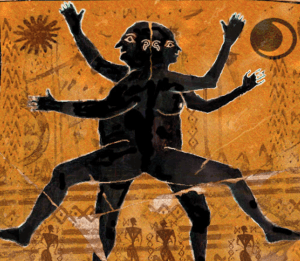Emma McAllister in Quillette:
 Since I first read Plato’s Symposium, I have been fond of Aristophanes’ account of the origin of love. The tale goes something like this. Human beings used to be spherical creatures with four legs, four arms, and two faces divided evenly between each side. We also used to come in three distinct varieties. Men were those composed of two male halves, women were those composed of two female halves, and the androgynous were those composed of both a male and a female half.
Since I first read Plato’s Symposium, I have been fond of Aristophanes’ account of the origin of love. The tale goes something like this. Human beings used to be spherical creatures with four legs, four arms, and two faces divided evenly between each side. We also used to come in three distinct varieties. Men were those composed of two male halves, women were those composed of two female halves, and the androgynous were those composed of both a male and a female half.
Everything was going swell for us, you might say, until the gods meddled, as they were wont to do. Fearing the power of humanity, Zeus sliced every human into two and had Apollo sew up the opening, with our belly buttons serving as a reminder not to test the power of the gods. Everyone found themselves feeling empty and longing for their other half, be it the woman you were attached to or the man you were attached to. Love was born out of the search to be whole.
I’m fond of this narrative for its simple beauty. But it is sadly incomplete. As progressives are quick to note, sexual attraction is more complicated than the pairings of men and women. People come in all sorts of shapes and sizes. And some categories of human are so peculiar that they can confound the very notion of healthy sexual attraction. In such cases, we sometimes use the term “fetish” to suggest that there is something odd, or even unwholesome, at play.
More here.
